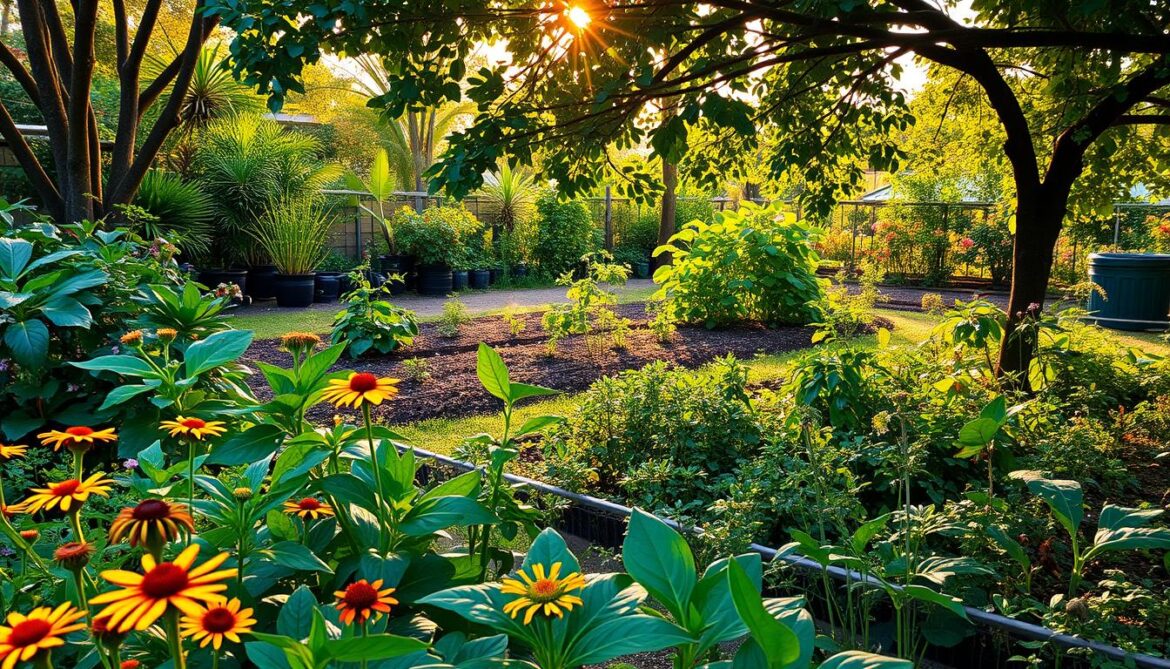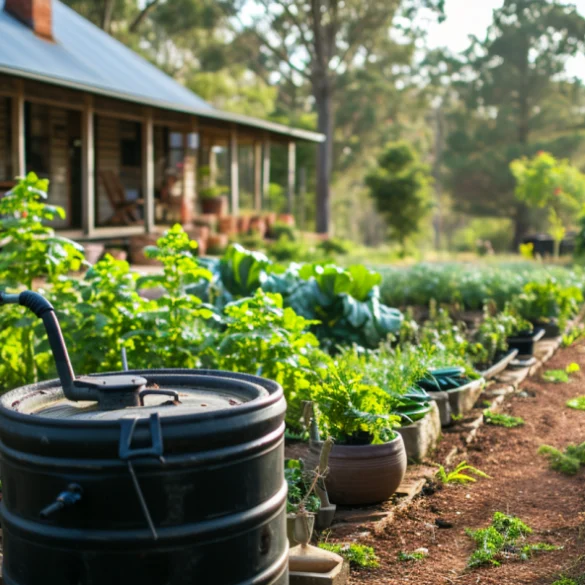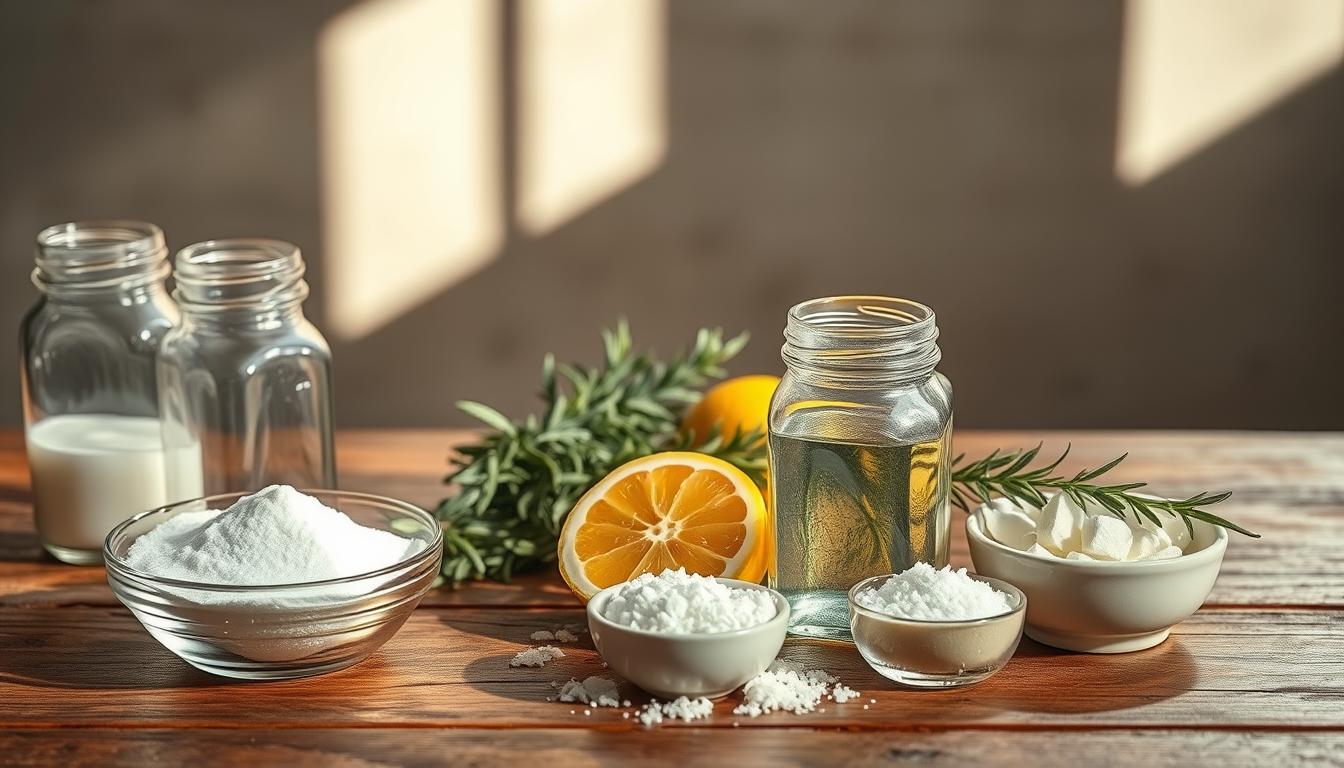Ever thought about having a great garden without harsh chemicals? In South East Queensland, our climate is perfect for growing but also brings pests. This makes keeping our gardens safe a big challenge.
Our beautiful Queensland gardens attract pests like fruit flies and aphids. These pests can turn our gardens into a fight zone. But, we don’t need to use harmful sprays to win this battle.
Sustainable Home Magazine says using eco-friendly pest solutions is key. It keeps your plants safe, helps beneficial insects, and keeps your family healthy. Plus, these methods often work better over time than chemicals.
Queensland’s weather is special and needs special pest control. By knowing our pests and using sustainable gardening practices, we can live in harmony with nature. This guide shows you how to do it in our region.
Key Takeaways
- Queensland’s subtropical climate creates unique pest management challenges requiring specialized approaches
- Natural pest control methods protect beneficial insects while effectively managing harmful pests
- Chemical-free solutions are safer for families, pets, and the broader ecosystem
- Understanding local pest cycles improves the effectiveness of natural control methods
- Sustainable approaches create long-term resilience, not just quick fixes
- Many natural solutions can be made from things you have at home
Understanding Queensland’s Unique Pest Pressures
Queensland’s homes and gardens face special pest challenges. The subtropical climate here attracts many pests. Knowing these challenges helps in using natural pest control methods.
The Impact of Subtropical Climate on Pest Activity
Queensland’s climate is perfect for pests all year. Unlike cooler states, our warm weather lets pests breed without pause.
High humidity and warm temperatures help pests grow fast. They can have many generations in one season.
Rainfall patterns significantly influence pest behavior in Queensland. Wet seasons bring more mosquitoes, cockroaches, and garden pests. Even when it’s dry, pests can stay active thanks to dew and irrigation.

Queensland’s climate means pests are a problem all year. Knowing this helps you stay ahead of pests.
Identifying Common Intruders: Home vs. Garden Pests in QLD
Queensland homes and gardens have their own pests. Knowing these pests helps in controlling them naturally.
Indoor pests like cockroaches and ants look for food and water in your home. Mosquitoes and flies move between indoors and outdoors, causing problems.
Garden pests harm your plants. Fruit flies, aphids, and mites can destroy your garden. Caterpillars and grasshoppers can defoliate plants quickly.
| Pest Type | Common in Homes | Common in Gardens | Natural Control Methods |
|---|---|---|---|
| Cockroaches | Very common (German, American) | Moderate (garden cockroaches) | Diatomaceous earth, boric acid baits |
| Ants | Very common (coastal brown) | Very common (green ants) | Vinegar barriers, cinnamon, coffee grounds |
| Mosquitoes | Common (evenings) | Very common (near water) | Remove standing water, essential oil sprays |
| Fruit Flies | Moderate (near fruit) | Very common (fruit trees) | Apple cider vinegar traps, fruit bagging |
| Aphids/Scale | Rare (houseplants only) | Very common (most plants) | Soap sprays, neem oil, ladybug attraction |
Why Natural Pest Control? Benefits for Health, Pets and Environment
Natural pest control in Queensland is better than chemicals. It’s good for your health, pets, and the environment.
Health protection is a primary benefit of natural pest control. Chemicals can harm you and your family. Natural methods are safer.
Pets are also safer with natural pest control. Chemicals can poison them. Natural methods keep them safe.
Queensland’s ecosystems also benefit from natural pest control. Chemicals can pollute waterways. Natural methods protect beneficial insects and the environment.
Setting Realistic Expectations for Organic Methods
Natural pest control has many benefits. But, it works slower than chemicals. It’s about prevention and managing pests, not getting rid of them all.
Consistency is key for natural pest control. Regular use and monitoring help it work better. Natural methods need time to show results.
Using different natural methods together works best. This approach creates a strong defense against pests. With the right mindset and effort, Queensland homes can stay pest-free without chemicals.
Foundational Strategies: Creating a Pest-Resistant Queensland Property
Turning your Queensland home and garden into a pest-free zone starts with key steps. Understanding and using these steps can greatly reduce the need for later treatments. These steps work together to make your place a place pests don’t want to be.
Effective natural pest management in Queensland’s subtropical climate starts with a few key steps. When you use them all together, they create a strong defense system that works all year.
Sealing Entry Points: Your First Line of Home Defence
Queensland’s climate makes home pest prevention tough. The heat can make materials expand and contract, creating gaps for pests.
Start with a thorough inspection of your home’s exterior. Look closely at areas where different materials meet. Check around windows, doors, pipes, and foundation joints. These spots are weak in Queensland homes because of our extreme weather.
Use the right sealants for different gaps. Silicone caulk is good for small gaps around windows and pipes. Expanding foam works for bigger openings. For doors, put in quality weather stripping and door sweeps that can handle our humid weather.
Don’t forget about roof access points. In Queensland’s older homes, gaps in roof tiles or eaves let in pests. Put mesh guards over vents and chimney openings, making sure they let in air.
Sealing your home is not a one-time job. The same weather that causes gaps will keep affecting your home. Make checking and fixing your home’s seals a regular part of your pest management plan.
Smart Landscaping Choices to Deter Pests in QLD Gardens
Your garden can either attract pests or keep them away, depending on your plants and layout. Queensland native plants have natural defenses against local pests, making them great for a pest-resistant garden.
According to Sustainable Home Magazine, using native plants makes a beautiful, easy-to-care-for garden that keeps pests away. Plants like lemon-scented tea tree, native lemongrass, and Westringia not only do well in our climate but also keep many insects away.
Consider making a buffer zone between your garden and home. A strip of gravel or mulch around your foundation keeps many crawling insects out. This simple step gives you an early warning and slows down pests trying to get in.
How you place plants matters too. Keep taller plants and shrubs at least 30cm from your home to stop them from being pest highways. Trim branches that touch or overhang your roof to block access for rodents and possums.
| Queensland Native Plant | Pests Deterred | Growing Conditions | Additional Benefits |
|---|---|---|---|
| Lemon Myrtle | Mosquitoes, flies, cockroaches | Full sun to part shade, well-drained soil | Fragrant leaves, culinary uses |
| Native Lemongrass | Mosquitoes, ticks, ants | Full sun, tolerates poor soil | Erosion control, ornamental value |
| Coastal Rosemary (Westringia) | Aphids, scale insects | Full sun, drought tolerant | Salt tolerant, attractive to beneficial insects |
| Tea Tree | Mosquitoes, flies, various insects | Full sun to part shade, adaptable to most soils | Essential oil production, bird habitat |
Sanitation Savvy: Eliminating Food and Water Sources Indoors and Out
Pests look for food, water, and shelter. By removing these, you make your place less appealing to pests.
In Queensland’s humid weather, controlling moisture is key. Fix leaks quickly, as small water sources can support many pests. Make sure gutters and downpipes direct water away from your home’s foundation to avoid moisture buildup.
In your kitchen, store food in airtight containers and clean spills right away. This is very important in Queensland, where even small food bits can attract ants. Clean countertops every night and empty bins often, specially those with food waste.
Outside, manage compost well by keeping bins at least 3 meters from your home. Use enclosed systems to keep pests out. Place rainwater tanks far from your home and ensure they’re sealed to stop mosquito breeding.
Remove garden waste quickly or compost it. Decaying plant material is a breeding ground for pests. Collect fallen fruit daily during harvest seasons to prevent fruit fly infestations that can spread in your garden.
The Importance of Good Airflow and Light in Pest Prevention
Queensland’s subtropical climate is perfect for pests and fungal problems. Good ventilation and light management are key to keeping pests away naturally.
In your garden, space plants well to allow air to flow between them. This reduces humidity and makes conditions less favorable for pests and diseases. Prune dense foliage to improve air movement through plants.
For indoor spaces, use exhaust fans in bathrooms and kitchens to lower humidity. Consider installing ceiling fans in damp rooms to keep mosquitoes away and prevent mold that attracts pests.
Natural light is a strong pest deterrent. Many pests prefer dark, quiet places. Open curtains during the day to let in sunlight. In the garden, avoid dense shade where slugs and snails can hide during the day.
If fungal problems happen despite your prevention, try this natural solution: mix one part milk to ten parts water and spray affected plants. The natural compounds in milk fight fungal growth without harmful chemicals.
These foundational strategies work together as a complete pest management plan. By sealing entry points, choosing smart landscaping, keeping your place clean, and ensuring good airflow and light, you create a place where pests find it hard to stay. This proactive approach is the core of natural pest control in your Queensland property.
Conquering Common Queensland Household Intruders Naturally
Queensland’s pests, from ants to cockroaches, can be managed naturally. This protects your family and the environment. The climate here is perfect for pests all year, but you don’t need harsh chemicals to keep your home pest-free.
Companies like Natraspray show that eco-friendly insect control works well. They have 26 licensed operators in Queensland and New South Wales. You can stay in your home during treatment, unlike with harsh chemicals.
Ant Annihilation: Non-Toxic Baits, Barriers and Deterrents
Queensland homes often fight off ants, more so in warmer months. Instead of chemical sprays, use non-toxic pest deterrents. Borax-based baits mixed with sugar or honey are effective. Worker ants carry this back to their nest, killing the colony.
Physical barriers also work well. Diatomaceous earth damages ants’ exoskeletons. Sprinkle it where ants enter. Cinnamon, chalk lines, or coffee grounds can also keep ants away.

Essential oils repel ants without harm. Peppermint, tea tree, lemon, and eucalyptus oils are good choices. Mix 10-15 drops with water and spray where ants enter.
For tough infestations, know the ant species. Coastal brown ants are different from green or sugar ants.
Cockroach Control Without Chemicals: Traps, Repellents and Deterrents
Cockroaches love Queensland’s warm, humid weather. Start with DIY traps using food lures. A jar with petroleum jelly and banana or bread attracts cockroaches but traps them.
Several natural substances repel cockroaches. Catnip, bay leaves, cucumber slices, and garlic cloves can be used. Mix baking soda and sugar to attract and kill cockroaches.
Prevention is key. Seal cracks and remove clutter. Services like Natraspray use chemical-free pest remedies that let you stay home during treatment.
Mosquito Management: Reducing Breeding Grounds & Natural Repellent Strategies
Mosquitoes are a problem in Queensland, carrying diseases like Ross River virus and dengue fever. Get rid of breeding spots. Check for standing water in saucers, gutters, and toys.
Install mesh screens on windows and doors. Use mosquito-repelling plants like citronella and lavender outdoors. These plants confuse and repel mosquitoes.
Make your own natural insect repellents with essential oils. A mix of witch hazel and oils is effective. Be careful during the wet season as mosquito numbers can rise quickly.
Spider Solutions: Natural Deterrents and When to Leave Them Be
Queensland has many spiders, some helpful, some not. Identify spiders before controlling them. Huntsman spiders eat cockroaches and other insects without harming humans.
Use essential oils to deter spiders. Apply peppermint, tea tree, or citrus oil sprays to entry points. Clean regularly to prevent spider growth.
For dangerous spiders like redbacks or funnel-webs, safely relocate them. If unsure, services like Natraspray can help. They use eco-friendly insect control methods.
Most Queensland spiders help control pests. A balanced approach keeps them away from living areas but lets them thrive elsewhere. This natural system helps manage pests effectively.
Guarding Your Greens: Organic Solutions for Queensland Garden Pests
Organic solutions are great for keeping pests away from your garden in Queensland. The warm weather here makes it easy for pests to grow. Using natural methods helps keep your garden healthy and pest-free.
Battling Sap-Suckers with Soapy Sprays & Oils
Aphids, scale, and mites love Queensland’s warm weather. They suck the sap from plants, causing damage. They also leave behind honeydew, which attracts mold.
Homemade insecticidal soap is a good first step. Mix 1 tablespoon of castile soap with 1 liter of water. Spray it on plants to kill these pests without harming them.

Horticultural oils are also effective. Neem oil is great because it repels and disrupts pests. Mix 5ml of neem oil with water and soap, then spray it in the morning to avoid leaf burn.
White oil is another good choice. Make it by mixing vegetable oil and liquid soap. Dilute it in water before using. These oils kill pests without harming good insects.
Managing Chewing Insects with Natural Methods
Caterpillars, grasshoppers, and beetles can ruin your garden. Catch them early by checking your plants every morning. Look under leaves for these pests.
Hand-picking is a good way to deal with big pests. For caterpillars, use Bacillus thuringiensis (Bt). It’s safe for good insects but kills caterpillars.
Use physical barriers to stop pests. Row covers let light and water in but keep pests out. Collars from cardboard or plastic protect stems from cutworms.
“Diatomaceous earth creates a microscopic barrier that dehydrates insects with exoskeletons while remaining completely safe for humans, pets, and soil health.”
For grasshoppers, attract birds with native plants and bird baths. Garlic spray keeps them away. Crush garlic, steep it in hot water, strain, and dilute it before spraying.
Fruit Fly Frustrations: Effective Traps, Barriers and Garden Hygiene
Fruit flies are a big problem in Queensland gardens. They lay eggs in fruit, causing maggots. This ruins your harvest.
Make homemade traps to catch fruit flies. Cut a plastic bottle in half, add vinegar, soap, and fruit. The vinegar attracts them, and the soap kills them.
Use mesh bags or netting to protect fruit. Cover individual fruits or small trees. For big trees, use netting with a mesh size under 1.6mm.
Keep your garden clean to stop fruit flies. Remove fallen fruit and harvest ripe fruit quickly. This stops them from laying eggs.
Natural repellents help too. A neem oil spray keeps fruit flies away. Reapply after rain to keep them off.
Natural Defences Against Fungal Diseases in Humid Conditions
Queensland’s humidity is perfect for fungal diseases. Keep plants apart to improve air flow. Prune plants to let air through.
A milk spray stops many fungal problems. Mix milk with water and spray plants weekly. The milk proteins stop fungi and help good microbes.
Baking soda is another natural way to fight fungi. Mix it with oil and soap in water. This changes the pH on leaves, stopping fungi.
Water plants in the morning to prevent fungal diseases. Water at the base to keep leaves dry. This stops fungi from growing.
Mulch with sugar cane or lucerne hay to stop fungal spores. A 5-10cm layer protects plants and improves soil.
These organic solutions help manage pests in Queensland gardens. They keep your garden healthy and balanced. These methods protect your plants and the good insects that help your garden.
Beneficials in Your Backyard: Inviting Nature’s Pest Controllers
Your Queensland garden can become a thriving ecosystem. It naturally keeps pest populations in check. This approach, known as biological pest control, works with nature. By creating the right conditions, you’ll attract a diverse army of helpers.
These helpers target specific pests while promoting overall garden health. According to Sustainable Home Magazine, gardens with abundant beneficial organisms require fewer interventions. They produce healthier plants.
This natural balance creates a self-sustaining system. It grows more resilient over time. Let’s explore how to transform your yard into a haven for these helpful allies.
Attracting Predatory Insects: Ladybugs, Lacewings, and Praying Mantises
Predatory insects form your first line of defense against common garden pests. A single ladybug can devour up to 5,000 aphids in its lifetime. These spotted helpers are incredibly valuable.
Lacewings, with their delicate green bodies, are equally voracious. They are nicknamed “aphid lions” in their larval stage. To attract these beneficial insects, incorporate plants they love into your garden design.
Mint, fennel, dill, and sunflowers serve as natural magnets for ladybugs and lacewings. Even common dandelions, often considered weeds, provide valuable habitat and food for these helpful predators.
Create dedicated “insect hotels” by bundling hollow stems. Drill holes in untreated wood blocks or stack small terracotta pots filled with straw. These structures provide shelter and breeding grounds for beneficial insects throughout Queensland’s varying seasons.

Maintain shallow water sources with landing spots to support these insects, even during Queensland’s hot summers. A dish with pebbles and water provides essential hydration without drowning your tiny helpers. Avoid broad-spectrum insecticides that kill beneficial insects alongside pests, disrupting the natural balance you’re working to establish.
Creating a Haven for Pest-Controlling Birds, Frogs and Lizards
Larger predators like native birds, frogs, and lizards consume significant quantities of insects. A single insectivorous bird can eat hundreds of insects daily. Frogs and lizards feast on slugs, mosquitoes, and various garden pests.
Incorporate Queensland native plants that provide food and shelter for local wildlife. Grevilleas, bottlebrushes, and banksias attract nectar-feeding birds that also consume insects. Dense shrubs and grasses create protective cover where birds can nest and lizards can hide.
Install bird baths at varying heights to accommodate different species, keeping them clean and filled with fresh water. For frogs, consider creating a small pond with gently sloping sides and surrounding vegetation. Even a buried container filled with water and aquatic plants can become a frog haven in smaller gardens.
Rock piles, log stacks, and brush heaps provide perfect microhabitats for lizards and skinks. Position these structures in sunny spots where reptiles can bask, but ensure they have quick access to cover. These simple additions create the varied habitat these pest controllers need to thrive in your garden.
Understanding and Encouraging Beneficial Nematodes and Microbes
Below the soil surface, microscopic allies work tirelessly to control pests and support plant health. Beneficial nematodes are tiny roundworms that seek out and infect soil-dwelling pests like lawn grub larvae, fungus gnats, and root-eating grubs. These invisible helpers are valuable in Queensland’s warm, humid conditions where soil pests can multiply rapidly.
You can introduce beneficial nematodes through commercial products targeted at specific pest species. Apply them during cooler evening hours when the soil is moist, following package directions for best results. These microscopic predators will reproduce naturally once established, providing ongoing protection.
Healthy soil teeming with beneficial microbes creates an environment where plants thrive and resist pest pressure. Regular applications of compost, worm castings, and organic mulch support diverse soil life. Avoid excessive tilling, which disrupts fungal networks and beneficial microorganism communities.
Sustainable pest control begins with soil health. As beneficial microbes break down organic matter, they release nutrients plants need to develop natural pest resistance. This underground ecosystem forms the foundation of your garden’s health and resilience.
The Crucial Role of Pollinators in a Healthy Pest Resistant Garden
Pollinators do more than ensure fruit production—they contribute significantly to overall garden health and pest resistance. Well-pollinated plants produce higher yields and develop stronger natural defenses against pests and diseases. By supporting diverse pollinator populations, you’re indirectly boosting your garden’s ability to withstand pest pressure.
Create continuous blooming cycles using plants suited to Queensland’s climate. Early bloomers like native hibiscus and grevilleas can be complemented by mid-season flowering herbs and late-season options like native daisies. This succession ensures pollinators have food sources year-round and remain in your garden to provide their services.
Incorporate a variety of flower shapes and sizes to accommodate different pollinator species. Shallow, open flowers suit butterflies and beetles, while tubular blooms attract honeyeaters and native bees. This diversity supports a wide range of pollinators, each contributing uniquely to your garden’s ecosystem.
Dedicate a section of your garden to biological pest control methods by creating a pollinator patch with native wildflowers. As Sustainable Home Magazine notes, these areas become hubs of beneficial insect activity, serving as nurseries from which helpful predators can spread throughout your garden.
By welcoming nature’s pest controllers into your Queensland garden, you’re creating a resilient ecosystem that largely manages itself. This approach requires patience as populations establish, but the reward is a balanced, thriving garden where serious pest outbreaks become increasingly rare. Your role shifts from constant intervention to thoughtful observation and support of the natural processes already at work in your backyard.
DIY Natural Pest Repellents & Traps: Safe and Effective Recipes
Creating your own pest repellents and traps lets you fight pests without harmful chemicals. These homemade solutions save money and let you tailor treatments for Queensland’s pests. You can make strong deterrents with kitchen items or local store finds.
Essential Oils for Pest Deterrence: Crafting Your Own Sprays
Essential oils are strong natural repellents. Peppermint oil fights spiders, citronella keeps mosquitoes away, and tea tree oil stops ants.
To make a basic spray, mix 15-20 drops of oil with 1 cup water and 1 teaspoon dish soap. The soap helps the oil and water mix well. For more protection, blend different oils like eucalyptus, lavender, and lemongrass.
Use essential oil sprays in the early morning or evening in Queensland’s sun. This prevents leaf burn. For indoor use, spray around doorways and windowsills.
Kitchen Pantry Pest Solutions: Garlic, Chilli, Vinegar and Herbs
Your kitchen pantry has powerful pest-fighting items. These items are cheap and fight many pests at once.
The garlic-chilli spray repels whiteflies, aphids, beetles, and mites. To make it:
- Mince three cloves of garlic and one hot chilli.
- Place in two teaspoons of vegetable oil and let steep overnight.
- Strain out the solids the next morning.
- Add the infused oil to 500mL of water.
- Mix in a teaspoon of dish detergent and shake well.
Apply this solution in the evening to avoid leaf burn. The garlic and chilli make insects dislike the taste. The soap and oil help it stick to plants.
White vinegar is another good repellent. Mix equal parts vinegar and water to keep ants and flies away. For gardens, try a herbal infusion spray with herbs like rosemary, thyme, or mint.
Building Effective DIY Traps for Flies Slugs and other Pests
DIY traps are a chemical-free way to fight pests. For fruit flies, use a plastic bottle with the top cut off and inverted. Fill it with apple cider vinegar and dish soap to attract and trap flies.
Use a beer trap to catch slugs. Bury a container so its rim is level with the soil. Fill it halfway with beer to attract slugs. Place traps near plants but not too close.
For indoor flying insects, make sticky traps with yellow cardboard and corn syrup and sugar. Hang them near windows or plants. The bright color attracts insects, and the sticky surface captures them.
“DIY traps are most effective when used as part of an integrated pest management approach. Combine trapping with preventative measures and natural repellents for best results.”
For cockroaches, mix equal parts baking soda and sugar in shallow dishes. The sugar attracts them, and the baking soda harms them once eaten.
Safe Handling, Application and Storage of Homemade Concoctions
Handling homemade pest deterrents safely is important. Always label your mixtures clearly with contents and the date. Most solutions last 1-2 weeks before needing to be replaced.
Store your concoctions in cool, dark places away from children and pets. Use glass containers for essential oils, as some oils can damage plastic. For vinegar or soap solutions, use repurposed spray bottles after cleaning.
When applying repellents, wear gloves to protect your skin. Test a small area of plants first to avoid any bad reactions. Apply directly to problem areas to protect beneficial insects.
Consistency is key with natural solutions. Apply every 3-5 days or after rain to keep protection up. Making your own pest control is affordable and tailored to Queensland’s pests, keeping your home and garden chemical-free.
Humane Deterrents for Common Queensland Wildlife Challenges
Managing wildlife in Queensland homes and gardens needs humane ways. These methods respect native species and protect your property. Unlike harmful chemicals, these approaches create boundaries without harming wildlife.
Let’s look at non-toxic pest control methods. They help you protect your space while caring for the local ecosystem.
Possum-Proofing Strategies for Your Home and Garden
Possums are protected in Queensland. You need humane ways to keep them away. They can damage gardens and make noise in roof spaces.
Start by sealing entry points to your home. Look for gaps in eaves, broken roof tiles, or unsealed vents. Metal mesh barriers are a good physical deterrent.
For garden protection, try these eco-friendly solutions:
- Install motion-activated sprinklers or lights to scare possums
- Use natural repellent sprays with garlic, chili, or citrus oils
- Protect plants with netting or wire cages
- Plant possum-resistant species like lavender and rosemary
Relocating possums is illegal in Queensland. Instead, make your property less appealing. Provide alternative habitats in your yard.
Living Alongside Snakes: Deterrents and Safety First Measures
Queensland’s warm climate means more snake encounters. Instead of fear, use preventative measures. This respects these important predators.
Change your landscape to reduce snake-friendly areas. Keep grass short and remove debris piles. Snake-repellent plants like lemongrass can help.
Always prioritize safety with snake remedies:
- Never try to catch or kill snakes – it’s risky
- Install snake-proof fencing with a smooth surface
- Keep pathways clear and well-lit
- Store firewood and building materials on raised platforms
- Have emergency numbers for snake removal
Commercial snake repellents with natural ingredients can also help. Apply them around your property’s perimeter.
Managing Nuisance Birds (e.g. Bush Turkeys, Pigeons) Humanely
Bush turkeys and pigeons can be a problem. They damage gardens and nest in inconvenient places. But, most native birds are protected, so focus on deterrence.
Protect your garden beds from bush turkeys. Physical barriers like sturdy netting or wire mesh work well. Place them before the breeding season.
Use these non-toxic methods to discourage nesting:
- Install bird spikes or sloped surfaces
- Use reflective objects like old CDs
- Apply bird-safe repellent gels
- Set up decoy predators like owl figures
Don’t interfere with active nests. It’s illegal in Queensland. Focus on prevention before nesting starts. Consult local wildlife authorities if issues persist.
Natural Rodent Control: Prevention and Non-Toxic Deterrents
Rodents are in Queensland homes all year, more in cooler months. Natural methods prevent and deter without harming pets or wildlife.
Start by sealing gaps around pipes, vents, and foundations. Mice can squeeze through small openings. Steel wool combined with caulking is a good barrier.
Try these eco-friendly pest management strategies:
- Remove food sources by storing pantry items in sealed containers
- Keep outdoor areas clear of fallen fruit and bird seed
- Apply peppermint oil, clove oil, or vinegar solutions around entry points
- Use ultrasonic repellent devices in enclosed spaces
For persistent problems, humane catch-and-release traps are a good solution. Check traps often and release rodents at least 1km from your home.
| Wildlife Challenge | Humane Deterrent Method | Effectiveness | Maintenance Required |
|---|---|---|---|
| Possums | Metal mesh barriers, motion-activated devices | High | Low (check annually) |
| Snakes | Habitat modification, snake-proof fencing | Moderate | Medium (seasonal checks) |
| Bush Turkeys | Physical barriers, reflective objects | Moderate to High | Medium (weekly adjustments) |
| Rodents | Exclusion techniques, essential oil repellents | High (when combined) | High (monthly refreshing) |
By using humane deterrents, you can keep unwanted wildlife away. This approach protects your Queensland home while respecting native species.
Seasonal Pest Hotspots: A Year-Round Queensland Guide
Queensland’s subtropical climate leads to predictable pest patterns. These patterns change with the seasons. Homeowners need to adjust their prevention strategies to keep pests away.
Knowing when pests are most active helps you prepare. This way, you can stop pests before they become a problem. This is key to effective integrated pest management in Queensland homes and gardens.
Summer Pest Peaks: Mosquitoes, Flies, Fruit Flies and Ants
Queensland summers are hot and humid. This is perfect for pests like mosquitoes. To fight mosquitoes, remove standing water from your yard.
House flies and fruit flies grow fast in the summer heat. Keep your kitchen clean and store fruit in the fridge. Use apple cider vinegar traps for fruit flies.
Ants are very active in summer. Use diatomaceous earth or cinnamon to keep them out. Don’t leave sweet foods out where ants can find them.
Spider mites love the hot, dry weather of summer. They make leaves look bad and create webs. Mist your plants and use predatory mites to control them.
Autumn Intruders: Rodents Seeking Shelter, Spider Populations
As it gets cooler and rains more, pests look for shelter. Rodents are a big problem in autumn. Seal up your home before autumn starts.
Spiders move indoors in autumn. Most are harmless, but vacuum and use essential oils to keep them away.
Cockroaches also become more active in autumn. Clean well and use boric acid traps to keep them away.
Winter Pest Watch: Persistent Indoor Pests and Overwintering Garden Issues
Queensland’s mild winters mean pests stay active all year. Cockroaches and silverfish need constant control. Keep your home clean and use traps.
Scale insects hide on plants in winter. Use dormant oil sprays to kill them before they start to grow again.
Winter is a good time to get ready for spring pests. Clean your garden and prepare the soil. This will help control pests when they come back.
Winter is also a good time to set up barriers. Use fruit tree bands and copper tape to keep pests out in the spring. This shows how to manage pests with the seasons.
Spring Surges: Aphids, Caterpillars and Lawn Grubs
As it gets warmer, pests grow fast in Queensland gardens. Aphids can quickly take over new shoots. Spray them with water or soap to stop them.
Caterpillars eat a lot in spring. They can destroy plants quickly. Use wasps or Bt sprays to control them.
Lawn grubs damage lawns in spring. Apply nematodes to the soil when it’s warm enough. This controls them without chemicals.
| Season | Primary Pests | Natural Prevention | Organic Treatment | Timing |
|---|---|---|---|---|
| Summer | Mosquitoes, flies, ants, spider mites | Eliminate standing water, seal food sources | Citronella oils, vinegar traps, diatomaceous earth | Early December (before wet season) |
| Autumn | Rodents, spiders, cockroaches | Seal entry points, reduce clutter | Peppermint oil sprays, boric acid traps | Late February to March |
| Winter | Indoor cockroaches, scale insects | Clean dark corners, prune affected plants | Dormant oil sprays, cedar wood repellents | June to July |
| Spring | Aphids, caterpillars, lawn grubs | Companion planting, soil preparation | Beneficial insects, Bt sprays, nematodes | Late August to September |
Sustainable Home Magazine says this seasonal approach is better. It lets you work with nature instead of fighting pests all the time. By knowing when pests are most active, you can stop them before they start. This makes your garden a better place.
Long-Term Pest Prevention: Sustainable Habits for Lasting Harmony
Keeping your Queensland property pest-free is a long-term commitment. It’s about building a strong relationship with your environment. By using sustainable gardening practices, you make your space more resistant to pests over time.
The Power of Observation: Early Detection and Intervention
Take a few minutes each week to walk through your garden and home perimeter. Look under leaves, check soil moisture, and note any unusual plant damage. This simple habit helps you spot problems early, before they get worse.
Companion Planting: Strategic Plant Pairings for Natural Pest Deterrence
Pairing plants wisely can protect your garden from pests. For example, chives can prevent scab in apple trees. French marigolds can kill soil nematodes. These pairings not only keep pests away but also attract beneficial insects.
Building Healthy Soil for Strong Pest Resistant Plants
Healthy soil means strong plants that fight off pests. Add compost regularly and use organic mulches. Avoid over-fertilizing. Queensland’s climate quickly breaks down organic matter, so keep adding nutrients seasonally to keep plants strong.
Fostering Biodiversity: Creating a Balanced Ecosystem in Your Yard
A diverse garden naturally controls pests. Include plants of different heights, flowering times, and growth habits. This diversity attracts beneficial insects, birds, and microorganisms, keeping pests in check without chemicals.
By using these sustainable methods, you’ll create a balanced ecosystem. Natural pest control will work well in your Queensland home and garden. Your outdoor space will be harmonious, needing less care but bringing more joy all year.
FAQ
Q: How does Queensland’s climate affect pest activity compared to other Australian regions?
A: Queensland’s subtropical climate is perfect for pests all year. It has high humidity, warm temperatures, and lots of rain. Unlike colder southern states, Queensland’s mild winters mean pests can keep reproducing and active all year. This means you need to manage pests all the time, not just in certain seasons.
Q: What are the most effective natural barriers for preventing ants from entering my Queensland home?
A: To keep ants out, use diatomaceous earth, cinnamon, and essential oils like peppermint or tea tree. Sprinkle diatomaceous earth where ants might enter. Cinnamon stops ants from crossing. Use essential oils on entry points, windowsills, and doors.
Q: How can I naturally control fruit flies in my Queensland garden?
A: To fight fruit flies, use apple cider vinegar traps and physical barriers. Place vinegar in containers with small holes. Use bags or nets over fruit. Remove fallen fruit quickly. Plant basil and marigolds near fruit trees to keep them away.
Q: Which Queensland native plants naturally repel common garden pests?
A: Many native plants repel pests in Queensland. Lemon-scented tea tree keeps mosquitoes and flies away. Native mint bush and lemon myrtle deter aphids and moths. Native rosemary keeps cabbage moths and beetles off.
Q: How can I manage possums without harming them, as they’re protected in Queensland?
A: To manage possums safely, install barriers on roof access points. Use lights or sprinklers to scare them away. Apply repellents like quassia chips. Plant possum-resistant plants. Consider a possum nesting box in a safe place.
Q: What’s the most effective natural cockroach control method for Queensland’s humid environment?
A: For cockroach control, use diatomaceous earth and boric acid baits. Sprinkle diatomaceous earth in hiding spots. Mix boric acid and sugar with water to make a paste. Use catnip or bay leaf repellents in cabinets. Keep your kitchen clean and seal entry points.
Q: How can I prevent mosquito breeding around my Queensland property during the wet season?
A: To stop mosquito breeding, empty standing water from containers and gutters. Use mosquito dunks in ponds. Keep swimming pools clean. Seal rainwater tanks with mesh. Fill in low-lying areas after rain.
Q: What natural fungicides work best in Queensland’s humid conditions?
A: Effective fungicides include milk spray and bicarbonate of soda. Milk spray fights powdery mildew. Bicarbonate of soda works on many fungal issues. Neem oil stops spore germination. Compost tea introduces beneficial microbes. Apply these in the early morning to avoid leaf burn.
Q: How can I attract beneficial predatory insects to my Queensland garden?
A: To attract beneficial insects, plant herbs like dill and mint. Include native plants that flower at different times. Create insect hotels and maintain shallow water sources. Avoid broad-spectrum pesticides.
Q: What’s the best natural solution for controlling lawn grubs in Queensland?
A: For grub control, apply beneficial nematodes to the soil. Use a dish soap drench to bring grubs to the surface. Encourage native birds and maintain lawn health. This will help control grubs naturally.
Q: How can I safely deter snakes from my Queensland property?
A: To deter snakes, remove hiding places and keep grass short. Install mesh fencing around key areas. Plant snake-repellent plants like lemongrass. Use commercial repellents around your property.
Q: What companion planting combinations work best for pest control in Queensland gardens?
A: Effective combinations include tomatoes with basil and citrus with lemongrass. Brassicas with thyme and rosemary confuse moths. Carrots with spring onions mask their scents. Marigolds control soil nematodes and attract beneficial insects.
Q: How can I make an effective natural spray for aphids that won’t harm plants in Queensland’s hot sun?
A: Mix mild soap, neem oil, and peppermint essential oil for an aphid spray. Apply in the early morning or evening to avoid leaf burn. Rinse plants with clean water a few hours later to prevent damage.
Q: What are the most effective natural rodent deterrents for Queensland homes?
A: Effective deterrents include peppermint oil-soaked cotton balls and ultrasonic repellers. Use steel wool and caulk to seal entry points. Plant mint and sage around your home. Encourage owls with nesting boxes.
Q: How can I build healthy soil that naturally deters pests in my Queensland garden?
A: Add compost and mulch to improve soil health. Use cover crops and crop rotation. Apply seaweed extract to boost plant immunity. Healthy soil makes plants stronger against pests.
Q: What natural methods work for controlling termites in Queensland homes?
A: Use orange oil or neem oil treatments on termites. Create barriers with diatomaceous earth. Plant termite-resistant plants like vetiver grass. Use beneficial nematodes and inspect regularly to keep termites away.
Q: How can I naturally manage bush turkeys that are destroying my Queensland garden?
A: Install chicken wire barriers and use motion-activated sprinklers. Make scratching uncomfortable with plastic forks and spiky branches. Create a designated scratching area. Manage them without harming them, as they’re protected.









